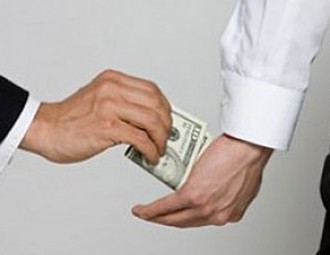Appointing corrupt officials to run enterprises, Belarus shows a chaotic way of fighting corruption

Perversely, the economic crisis may incentivize authorities to battle corruption in order to clean up the budget and keep the economy afloat, writes Ryhor Astapenia.
Last month, Aliaksandr Lukashenka pardoned six top officials charged with corruption. Not only that – he appointed them to manage unprofitable state-owned enterprises.
The decision reflects a haphazard approach to fighting corruption. Belarus ranked 107 out of 168 countries in a recent report by Transparency International, a non-governmental organisation that monitors corporate and political corruption in international development. Belarus ranks higher than Russia and Ukraine but much lower than countries of the European Union.
Belarusian authorities recently promulgated a new anti-corruption law with additional incentives to report on corrupt practises but corruption among high-ranking executives goes largely unpunished.
How Belarus fights corruption...
In Transparency International’s new Corruption Perceptions Index report, published 27 January, Belarus performs better than neighbouring Ukraine and Russia. It ranked 107th, compared to 119th last year, suggesting improvements in enforcement efforts. Still, Belarus lags far behind its three EU neighbours – Poland, Lithuania and Latvia – who rank 40th or higher in the index.
On 24 January, a new law on combating corruption came into force. New provisions include lowering pensions for corrupt officials and limiting the gifts that officials can receive and the business ventures their family members can engage in.
Perhaps most striking is a regulation offering awards to individuals who report corrupt practises – about $500 per violation reported, a considerable amount relative to the average wage in the country (between $400 and $600 per year, depending on the exchange rate).
According to the Belarusian Statistical Office, the number of prosecutorial investigations of corruption increased by 40% between 2011 and 2014 (from 581 to 817). The number of initiated criminal cases increased by 440% (from 32 to 141).
More and more influential people are being investigated. A recent example is the former Minister of Commerce Valiantsin Chakanau, the only cabinet official to lose his job after last year’s presidential election. He was arrested on corruption charges on 18 December 2015, the day after he was replaced at the Ministry of Commerce. He remains in prison.
... and why Lukashenka frees corrupted officials
Only 37.8% of Belarusians expect the new anti-corruption law to make a difference, according to a recent survey by the Independent Institute of Socio-Economic and Political Studies (IISEPS).
The public has reason to be sceptical. Over the past month, at least six officials imprisoned for corruption left prison ahead of schedule. Aliaksandr Lukashenka not only pardoned them, but also appointed them to manage state-owned enterprises on the verge of bankruptcy.
The exonerated officials do not appear linked to one another, and each committed rather different crimes. For example, Viktar Khadasevich stood accused of stealing sausages from the meat processing plant he managed. Aliaksandr Arkhipau, the former Deputy Attorney General, tried to close a murder investigation in exchange for a bribe. The court sentenced Arkhipau behind closed doors, so not many details became public. Lukashenka later stated that the bribe was “a bar of gold and a bottle of cognac.”
According to the state-run media, the five officials were freed at the behest of the Belarusian parliament. The parliament has apparently prepared a list of other persons for the Belarusian president to pardon. If true, more officials charged with corruption could be released from prison in the near future. The names of possible beneficiaries have not been made public.
In any case, the release and reappointment of the five officials demonstrates two important trends.
First, the authorities clearly lack qualified people to fill positions in state institutions, especially at the elite level. The authoritarian regime has pushed a large number of smart people to either leave the country or at least steer clear of government service. As economic analyst Serge Chaly puts it, "Nobody wants to be a minister in Belarus."
Perhaps the authorities have no choice but to create “penal battalions” of corrupt officials to manage loss-making enterprises. Indeed, such appointments are nothing new. In 2008, a Belarusian court sentenced the former chairman of state-owned petroleum and chemical conglomerate Belneftekhim, Aliaksandr Barouski, to five years in prison for embezzling $1.5 million in funds from his enterprise. A year later, Barouski became the general director of Minsk Automobile Plant, a state-owned enterprise that to this day is fighting for survival.
Second, corruption is not exactly viewed as a mortal sin by the Belarusian authorities. Given the low rates of official compensation of state bureaucrats, it may seem normal for officials to supplement their meagre incomes with unofficial bonuses. According to Lukashenka, even state ministers earn less than two thousand dollars in Belarus.
And yet, plenty of officials have became exorbitantly wealthy and do not hesitate to flaunt their wealth in expensive real estate properties and luxury goods. One example is Mikhail Miasnikovich, the head of the Upper Chamber of the Belarusian Parliament, whose watch reportedly cost $30,000.
Another example is former Minister of Justice Viktar Halavanau, who several months ago put his house, located in the elite Drazdy area of Minsk, on the market for $1.4 million. These are very large sums for Belarus where the average salary in Belarus has been several hundred US dollars for many years.
These cases show that the country's leaders live by the principle: “For my friends, everything. For my enemies, the law.”
But now the economic crisis in Belarus has become a vexing problem for many officials. As the state budget shrinks, there may be less room to siphon off funds. Perversely, the economic crisis may incentivize authorities to battle corruption in order to clean up the budget and keep the economy afloat.
Sooner or later, however, Lukashenka will free another group of corrupt officials, if only to fill government posts that no one else wants to fill.
Originally published at BelarusDigest
-
03.01
-
07.10
-
22.09
-
17.08
-
12.08
-
30.09










































